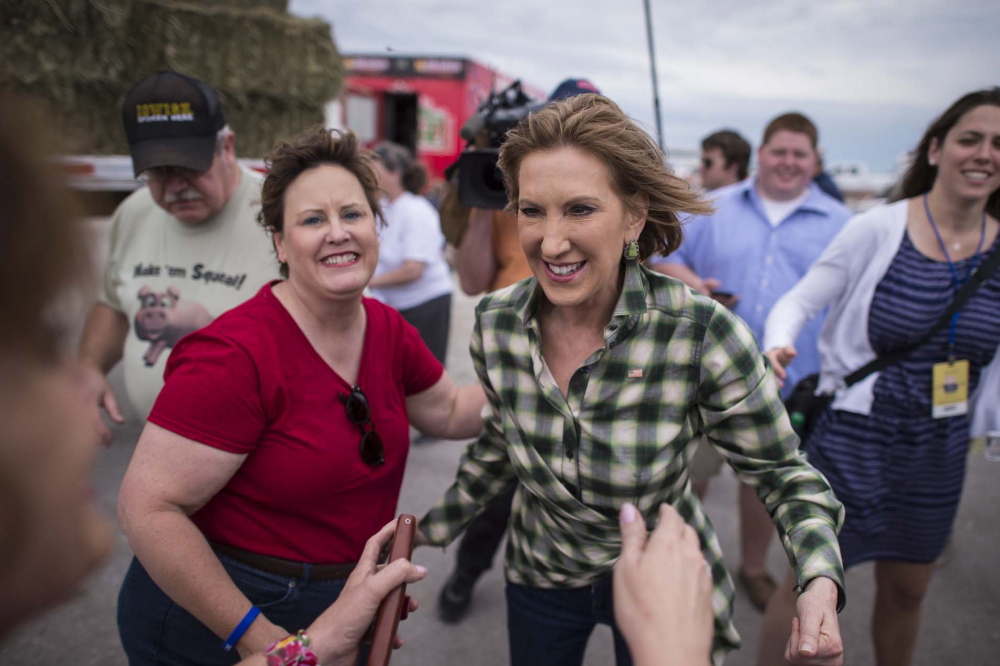The trend that worries conservative thinker Sabrina Schaeffer is this: Three elections ago, nearly half of all working mothers chose George W. Bush. In 2008, the share dropped to 40 percent for Sen. John McCain. By 2012, only roughly a third backed Mitt Romney.
But even more alarming to Schaeffer is that few, if any, of the current presidential candidates have made the needs of female breadwinners a centerpiece of their campaigns.
“For years now, Democrats have been saying: We are focused on women in the workplace,” said Schaeffer, executive director of the Independent Women’s Forum, a nonprofit organization that promotes conservative policies. “For whatever reason, Republicans keep ignoring these issues. It’s the absolute worst thing they can do. They need to understand, engage and offer better solutions. They can’t be afraid.”
Schaeffer is among a chorus of conservatives who have grown frustrated – and increasingly vocal – about the lack of proposals from Republican candidates that could help reverse this exodus of swing voters from the party.
These conservatives say Republicans have an opportunity to exploit a number of new proposals in Washington that have been embraced by right-wing policymakers and economists.
But some Republican strategists say that many of the candidates are planning to wait until after the primary to take up such ideas, so as to not prematurely alienate social conservatives who believe families are better off when one parent stays home. That has dismayed some in the party who view the matter as urgent, especially with Hillary Rodham Clinton looming as the likely Democratic nominee.
“Every parent who works has been through the day-care nightmare,” said Douglas Holtz-Eakin, who was the senior economic policy advisor to McCain during the 2008 election. “This has been underappreciated by Republican candidates in part and conservatives in general.”
Although several of the Republican candidates have long supported expanding the child tax credit, some conservative women leaders say that idea may not be enough to compete with Democrats.
Right-leaning policymakers have been floating other proposals. An economist at the American Enterprise Institute has recommended allowing pregnant workers to claim part of their tax refund early to fund their maternity leave. A Heritage Foundation economist has proposed loosening labor regulations so parents can easily swap overtime pay for compensation days. Others are advocating for over-the-counter birth control.
Sen. Deb Fischer, R-Nebraska, wants to reward companies with a 25-cent tax credit for every dollar spent on its employees’ family or medical leave.
“The public is watching,” Fischer told conservative economists, pundits and strategists earlier this month. “If we leave this narrative to our friends on the left, we don’t stand a chance.”
Such ideas are emerging as the economic challenges facing working women and mothers are mounting.
Women now financially support 40 percent of all households in the United States, the Pew Research Center recently found, compared to just 11 percent in 1960. Out-of-pocket spending on child care has nearly doubled over the last 30 years, according to the Census Bureau. The average cost of infant care now exceeds the price of public college tuition in 31 states.
In Virginia, for example, a critical swing state, the average cost of full-time day care runs about $10,000 per year. The price swells in cities.
Only 13 percent of American workers, meanwhile, have access to paid family leave or time away from work to recover from a pregnancy, according to the National Partnership for Women and Families.
“As a general matter, women are really busy,” said Kate O’Beirne, policy adviser to the Conservative Reform Network. “They’re always juggling and prioritizing. You’ve got to get their attention by talking about concrete ways to help.”
Working mothers were 12 percent of the 2012 electorate, according to a national exit poll by Edison Media Research. That share, which has remained steady since 2004, will likely grow, based on historic voting patterns – women typically outnumber men at the polls – and the changing work climate, analysts say.
Clinton is already cranking up the pressure on this front on the campaign trail, condemning the country’s lack of paid maternity leave, maternal wage gap and dearth of affordable day-care options.
Copy the Story LinkSend questions/comments to the editors.



Success. Please wait for the page to reload. If the page does not reload within 5 seconds, please refresh the page.
Enter your email and password to access comments.
Hi, to comment on stories you must . This profile is in addition to your subscription and website login.
Already have a commenting profile? .
Invalid username/password.
Please check your email to confirm and complete your registration.
Only subscribers are eligible to post comments. Please subscribe or login first for digital access. Here’s why.
Use the form below to reset your password. When you've submitted your account email, we will send an email with a reset code.